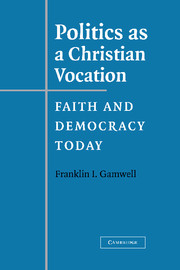Book contents
- Frontmatter
- Contents
- Preface
- Politics as a Christian Vocation
- Introduction: The Present Purpose
- 1 Render to Caesar
- 2 Government by the People
- 3 Faith and the Way of Reason
- 4 Justice in the Community of Love
- 5 Religious Decisions at Stake
- 6 Political Deliberations
- Appendix: On the Humanistic Commitment
- Works Cited
- Index
2 - Government by the People
Published online by Cambridge University Press: 18 February 2010
- Frontmatter
- Contents
- Preface
- Politics as a Christian Vocation
- Introduction: The Present Purpose
- 1 Render to Caesar
- 2 Government by the People
- 3 Faith and the Way of Reason
- 4 Justice in the Community of Love
- 5 Religious Decisions at Stake
- 6 Political Deliberations
- Appendix: On the Humanistic Commitment
- Works Cited
- Index
Summary
Christians today cannot simply assume that the early account has abiding authority for their political responsibilities. Given modern conditions that are or approach being democratic, the situation in which unreserved love for God and neighbor relates to politics has altered dramatically, raising the question of whether the view dominating Christian thought from Paul to Augustine was, in one way or another, an application of Christian belief dependent on social and culture circumstances peculiar to the time. Contrary to that tradition, Christians in modern circumstances that are or approach being democratic may be commonly called to political activity for justice and the common good. Still, the discussion to this point has not shown that politics today is a common Christian vocation. As we noted, the difference between modern democracy and early Christian political conditions does not warrant departure from the early account unless Christian faith prescribes or, at least, does not prohibit democracy as a form of government, and we are some considerable distance from a successful defense of that conclusion.
Indeed, there is another defense of the early account. Whatever the distinct conditions of modern life, one might say, Christians are not commonly called to political activity because, under those conditions as everywhere else, Christian faith asserts the inherent political inequality of human beings and prescribes rule by the one or the few. Some early Christian thinkers, we have noted, affirmed monarchy as the best form of government, and Augustine at least took it for granted.
- Type
- Chapter
- Information
- Politics as a Christian VocationFaith and Democracy Today, pp. 28 - 55Publisher: Cambridge University PressPrint publication year: 2004



